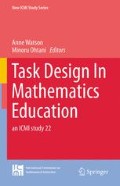Abstract
Principles of task design are described in the context of Japanese Lesson Study. Then, through analyzing tasks used for research lessons, and analyzing teachers’ discussions during lesson planning, this chapter identifies some critical activities in designing tasks in Japanese Lesson Study. It is shown that task design and evaluation are based on kyozaikenkyu, a critical but underappreciated element of Japanese Lesson Study, and address broad educational values. Furthermore, tasks are created and designed with consideration of anticipated student thinking and solutions and are evaluated through the post-lesson discussion that follows a research lesson.
The author would like to thank Thomas McDougal for reading and editing numerous revisions and for his invaluable comments on this chapter
References
Doig, B., Groves, S., & Fujii, T. (2011). The critical role of task development in lesson study. In L. C. Hart, A. S. Alston, & A. Murata (Eds.), Lesson study research and practice in mathematics education (pp. 181–199). Dordrecht: Springer.
Fernandez, C., & Yoshida, M. (2004). Lesson study: A Japanese approach to improving mathematics teaching and learning. New York: Routledge, Taylor & Francis Group.
Fujii, T. (2008). Knowledge for teaching mathematics. Plenary talk at the 11th International Congress on Mathematical Education, Monterrey, Mexico, July 6–13.
Fujii, T., & Stephens, M. (2001). Fostering an understanding of algebraic generalisation through numerical expressions: The role of quasi-variables. In H. Chick, K. Stacey, J. Vincent, & J. Vincent (Eds.), Proceedings of the 12th ICMI Study Conference: The Future of the Teaching and Learning of Algebra (pp. 258–264). Melbourne: University of Melbourne.
Fujii, T., & Stephens, M. (2008). Using number sentences to introduce the idea of variable. In C. Greenes & R. Rubenstein (Eds.), Algebra and algebraic thinking in school mathematics (pp. 127–140). Reston, VA: National Council of Teachers of Mathematics.
Lewis, C. (2002). Lesson study: A handbook of teacher-led instructional change. Philadelphia, PA: Research for Better Schools, Inc.
Lewis, C., & Hurd, J. (2011). Lesson study step by step: How teacher learning communities improve instruction. Portsmouth, NH: Heinemann.
Shimizu, Y. (2010). A task-specific analysis of explicit linking in the lesson sequences in three Japanese mathematics classrooms. In Y. Shimizu, B. Kaur, R. Huang, & D. Clarke (Eds.), Mathematical tasks in classrooms around the world (pp. 87–101). Rotterdam: Sense Publishers.
Stigler, J., & Hiebert, J. (1999). The teaching gap: Best ideas from the world’s teachers for improving education in the classroom. New York: The Free Press.
Watanabe, T., Takahashi, A., & Yoshida, M. (2008). Kyozaikenkyu: A critical step for conducting effective lesson study and beyond. In F. Arbaugh & P. M. Taylor (Eds.), Inquiry into mathematics teacher education (AMTE monograph series, Vol. 5, pp. 131–142). San Diego, CA: Association of Mathematics Teacher Educators.
Yoshida, M. (1999). Lesson study: A case study of a Japanese approach to improving instruction through school-based teacher development. Unpublished Ph.D. dissertation, Department of Education, University of Chicago.
Author information
Authors and Affiliations
Corresponding author
Editor information
Editors and Affiliations
Rights and permissions
Open Access This book was originally published with exclusive rights reserved by the Publisher in 2015 and was licensed as an open access publication in March 2021 under the terms of the Creative Commons Attribution 4.0 International License (http://creativecommons.org/licenses/by/4.0/), which permits use, sharing, adaptation, distribution and reproduction in any medium or format, as long as you give appropriate credit to the original author(s) and the source, provide a link to the Creative Commons licence and indicate if changes were made.
The images or other third party material in this book may be included in the book's Creative Commons license, unless indicated otherwise in a credit line to the material or in the Correction Note appended to the book. For details on rights and licenses please read the Correction https://doi.org/10.1007/978-3-319-09629-2_13. If material is not included in the book's Creative Commons license and your intended use is not permitted by statutory regulation or exceeds the permitted use, you will need to obtain permission directly from the copyright holder.
Copyright information
© 2015 The Author(s)
About this chapter
Cite this chapter
Fujii, T. (2015). The Critical Role of Task Design in Lesson Study. In: Watson, A., Ohtani, M. (eds) Task Design In Mathematics Education. New ICMI Study Series. Springer, Cham. https://doi.org/10.1007/978-3-319-09629-2_9
Download citation
DOI: https://doi.org/10.1007/978-3-319-09629-2_9
Publisher Name: Springer, Cham
Print ISBN: 978-3-319-09628-5
Online ISBN: 978-3-319-09629-2
eBook Packages: Humanities, Social Sciences and LawEducation (R0)

